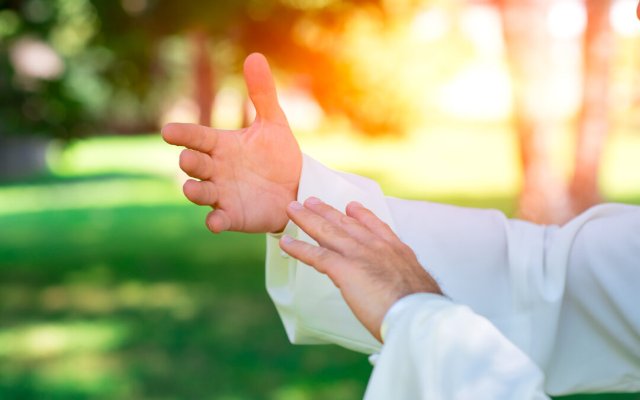Calm, but alert;
Relaxed, but ready’;
Smooth, but sharp;
Humble, but confident.
This is martial arts. It is an integral part of our training at the Five Immortals Temple in China, where I lived as a monk. It is part of what I teach today in the Berkshires of western Massachusetts.
In every student’s first class of taiji they hear me say “taiji is life.” A daily taiji practitioner acquires great balance and nimbleness, and an ability to recognize incoming energy – the direction from which one is being attacked. We also acquire the skill to respond to that incoming energy either to deflect and divert it, or to dispel it. The same is true for all forms of martial arts, of which taiji is only one.
Recognizing that there is a difference between what we do and how we do it, taiji offers various moves and maneuvers to employ when confronted by incoming energy. Not all must be dealt with aggressively, and in fact, emphasis is focused simply on creating a safe space for oneself and a means of avoiding serious conflict.
In Chapter 27 of the Dao de Qing, Laozi wrote:
A good walker leaves no traces or tracks.
A good speaker makes no slips or errors.
A good calculator needs no counting-sticks or tallies.
A good locksmith uses no bolts or keys, yet no one can open.
A good binder uses no ropes or cords, yet no one can loosen.
Alan Watts once said that trying to define who you are is like trying to bite your own teeth; one of my Zen Buddhist masters used to say it was like trying to see your own eyeballs. Laozi is telling us in this passage to simply be, to remain open to reality. He goes on to write:
What is a good man but a bad man’s teacher?
What is a bad man but a good man’s job.
If you don’t understand this, you will get lost,
However intelligent you are.
He reminds us here, also, to remain open-hearted. To see things merely as they are; to simply be. No judgment, no duality, no good or bad, which are only the two sides of a single coin. To not get lost in your own moral judgments. To do good, or at least to do no harm.
Each day we face incoming energy. Most of it is benign; some might be benevolent, and some might wish us harm. An unhappy co-worker or supervisor determined to share that unhappiness with us; a person we pass on the sidewalk who nods to us with a smile; a rival who means us mischief.
In the face of all, we learn from our taiji practice to remain calm, but alert, and recognize the source of the energy. We remain relaxed, but ready to respond to that energy in the most appropriate way. We remain smooth, but sharp, knowing we will respond only if we must. We remain humble, but confident; we know what we are capable of, but wish to hide our ability except only to be safe.
And we understand that we can lead by our example. With nothing to prove, we can act, or not, as each moment requires of us. We prefer to leave no tracks. If we can help, we must. We act, or not, and then just move on.
All martial arts forms are moving meditations. They are breath-driven every bit as much as sitting meditation. When we play taiji, there is just taiji, and stillness is the result.
This is martial arts. This is taiji. This is life. And it is the cultivation of stillness.

